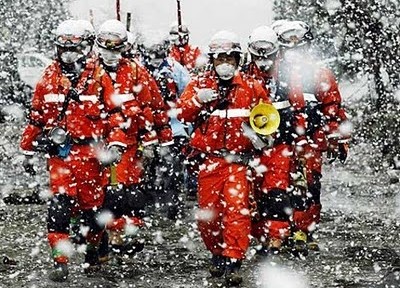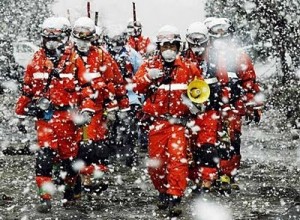On Friday 11th March at 14:46 local time, the largest earthquake in Japanese history (8.9 Richter) struck the area of Tohoku, located off the coast of Japan. This powerful tremor triggered a tsunami destroying a large part of the northeast. In response to these sudden events, warnings have been sent to as far as California and Chile. Interestingly, the word ‘tsunami’ comes from the Japanese ‘tsu’ meaning ‘harbour’ and ‘nami’ meaning ‘wave’.
The intensity and strength of this quake did not only reach the aerial atop of Japan’s landmark – the Tokyo Tower – leaving it bent, but also the nuclear power plant of Fukishima Daiichi located 240km from Tokyo. Four of the plant’s reactors have been damaged and consequently citizens have been asked to conserve energy. Naoto Kan, Japan’s prime minister, said the country was now experiencing “its worst crisis since the Second World War”, as it handles the aftermath of the calamity. Over 10,000 people are believed to have died, although the official death toll lies at around 4,000. Meanwhile, hundreds of thousands of people have spent the past few nights at shelters, with little food and water supplies.
This disaster is not only having an impact on human life but also on Japan’s economy. In the past few years – with particular attention to the past few months – markets have been greatly unstable. In order to decrease the current unease amongst markets, Masaaki Shirakawa, director of the bank of Japan has reacted fast and informed that he would provide liquidity – amounting to a total between £15.2bn-£22.8bn, according to the Financial Times – in order to keep borrowing costs low. Experts have wide-ranging perspectives on what is to be of Japan’s economy – the third biggest in the world. According to a certain risk modelling company it is estimated that in the worst-case scenario this tragedy will cost Japan as much as $35bn (approx. £22bn). Seeing as before the quake Japan was still in ‘recession’, its vulnerability at this time is large and the economy is definitely taking a hit, which in turn is unnerving global investors. Consequently, commodity prices have fallen – in particular oil prices, falling to their lowest levels all month – as the demand for these from one of the world’s leading economies, has rapidly dropped.
At the same time the Yen rose to its highest in 15 years following the belief of investors that Japan will need to redeem overseas assets in order to cope with the costs of the country’s reconstruction and insurance pay-outs. To combat the investor’s exploitation of Japan’s current misfortune – by attempting to drive up the prices of the Yen – some of the world’s most powerful central banks have decided to sell billions of dollars worth of Yen. The fact that there is more Yen available means Japan is able to pay less for buying back its currency.
Despite the severity of the current situation, it is believed that in the long-run Japan’s economy is likely to bounce-back. Yes, there is an obvious halt to economic growth and in fact, exports from various manufacturers have temporarily stopped placing the country in a semi-standstill, however, one has to note that following the Kobe earthquake in 1995 Japan made an impressive come-back. Even Japan’s own representatives are downgrading the economic impact of the disaster and in particular, Kaoru Yosano – a minister for economic and fiscal policy – says that the areas most affected account for only 4.1 per cent of Japan’s GDP.
Finally, according to Jasper Koll – head of research at JP Morgan in Tokyo – “Japan will recover, there’s lots of resources, there’s lots of funding and there is a tremendous amount of excess saving here and, ironically, this disaster will actually shake up the Japanese government and policies are going to add tremendously to growth”, adding that “T?hoku – the region that is being affected – is about 8 per cent of the national economy.” We hope that this difficult situation that Japan is facing will be remedied soon.

